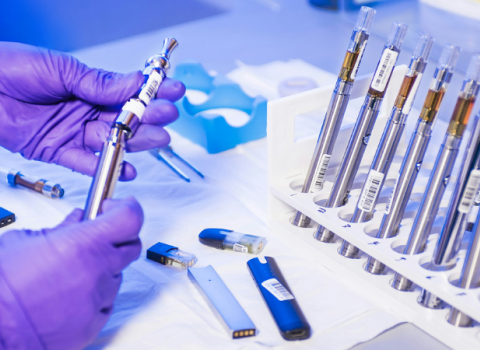
Philippe Pouletty, president of France Biotech. Picture from Atlanpole.
Currently France comes a poor third in the European biotech stakes behind the UK and Germany, with the UK having had the advantage of an earlier start and Germany of soft money poured in by government to promote the sector.
Related article
Pasteur heads for the top [link]
The gaps are down to three factors according to Pouletty: the level of interest from venture capital funds; support for knowledge transfer from academia; and access to initial public offerings. “In order to catch up with other countries you don’t just run a little faster. If you want to close the gap you need to be much faster.”
Since taking over at the helm of the trade association France Biotech in April 2001, Pouletty has launched a string of initiatives to get the sector up to speed. His attempts to improve the climate for biotech investing are heavily influenced by his time spent in California, and his experiences in founding three companies, SangStat, ConjuChem and DrugAbuse Sciences.
Pouletty is also founder and president of the Strategic Council on Innovation, a body he established to provide independent advice to the government on innovation and research policy. One notable success was the introduction of measures to stimulate innovation in January 2004. The keystone was the creation of a new status for start-ups called Young Innovative Companies, which exempts them from taxes and social security contributions. France Biotech claims this makes France the most attractive country from a tax and social costs standpoint for young research-driven companies.
Success stories needed
At present France has only handful of listed biotech companies compared with more than a dozen in Germany and about five dozen in the UK. “There are probably 10 to 15 companies in France now that would be public if they were in the UK,” said Pouletty. “The point is, we need success stories to improve the whole industry. That’s how you attract venture capitalist to get involved in technology transfer from academia.”
Currently France Biotech is campaigning for similar status for listed companies, asking the government to create Young Innovative Listed Enterprise (YILE) status for public companies that make a high level of investment in R&D.
“We propose that listed companies carrying out research be exempt from wealth tax, capital gains and inheritance tax,” said Pouletty. “This would provide huge cash savings to newly-quoted SME, fuelling their growth.” YILE status would also prevent high tech SMEs from relocating abroad, or being taken over.
Similarly, France Biotech, which currently has 150 corporate members, is working on persuading the government to provide incentives to venture capitalists that invest in technology start-ups. As part of this Pouletty argues that the French government needs to understand that policies on investing in research and technology should be integrated with mainstream economy policy.
For example, pension funds in the UK invest in technology companies but in France, fewer than 7 per cent of similar institutional investments are in the SME sector. “So that explains why venture capitalists are more interested in biotech in the UK or the US. If we had a policy of directing 5 per cent of institutional investment towards technology start-ups, you would see a very dynamic and vibrant industry.”
For all Pouletty’s efforts the stark fact is that the financing situation for French biotech start-ups is deteriorating. In 2005 venture capital investment collapsed. Seed investment fell to €50 million from €70 million in 2004, while investment in second rounds was a measly €27 million, down from €159 million in 2004.
According to France Biotech this fall is down to “the justified fear of investors not to be able to withdraw their investments during an IPO.”
The French paradox
France Biotech says the current mixed signals have inspired the development of what it terms a “French paradox”. While VC investment is at rock bottom, tax savings made under the Young Innovative Enterprise Status are flowing back into R&D: last year 74 percent of companies with the status recruited new staff, 51 percent started new research projects, and 49 percent bought new high tech equipment. Several foreign investors were drawn to make investments in tax-exempt companies. At the same time the pipeline of drugs in development expanded from 2004 to 2005.
The third front opened up by Pouletty is the push for a new National Science Agency. Rather than hand out money to universities or institutes to spend as they choose, the new agency will fund research on a project-by-project basis. Pouletty believes this will have the dual benefit of improving the quality of research and providing incentives for top class researchers. “French researchers lack incentives, because no matter how good they are, they all earn the same.”
“I think it will take five years before this increase in the quality of science translates through, but at least it demonstrates the government now understands that research and technology is a key factor in economic growth, as opposed to say five years ago when people talked about these objectives but didn’t put much effort behind them.”





 A unique international forum for public research organisations and companies to connect their external engagement with strategic interests around their R&D system.
A unique international forum for public research organisations and companies to connect their external engagement with strategic interests around their R&D system.